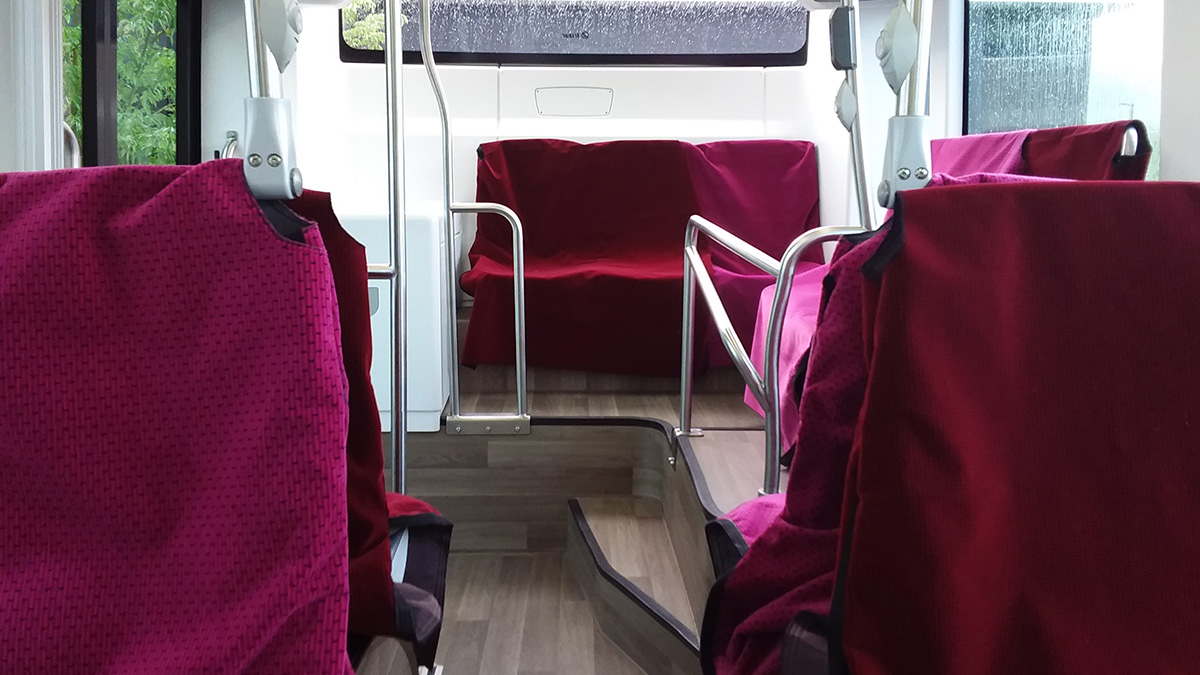
Irizar e-mobility and the circular economy
Aduna, 20 October 2020
Irizar e-mobility, a company that manufactures 100% electric coaches and trucks, is working with Emaús Funcación Social on circular economy projects. The first job done was reusing excess textile materials to make seat and dashboard protective covers.
The goal of Irizar e-mobility is to give a second life to the waste generated in the manufacturing process of its vehicles. To those ends, covers to protect the seats and dashboard during the bus production and assembly process have been made to prevent even the tiniest scratch or defect in the process. After analysing the waste from its production cycle, they decided to use the textile remnants from lining the roof, walls and other items which are sent to the Emaús SINdesperdicio social integration company to be transformed. In that way, an interesting circle is closed in which waste becomes a resource and, moreover, the products are produced in solidarity.
It is clear that with current forms of production and consumption there is a tendency to use up the resources we have and that the circular economy was created to put a brake on the waste of raw materials and reduce consumption. It is not for nothing that Irizar e-mobility is a company committed to the environment. It keeps investing in alternative energy sources and it provides a second life to the batteries it manufactures. And now, it is adding this circular economy project.
The covers are just the beginning.
With the philosophy to break the paradigm of the linear economy of buying, using and throwing away, and with the goal to reduce, reuse and recycle, from now on the waste generated in every production phase will be exhaustively analysed. In that way, alongside Emaús Fundación Social, they will analyse possible new circles that can be closed and either absorbed by the social entity or through other agents or even through industrial symbiosis to produce using the waste from several companies. The linear system of our current economy (extraction, manufacturing, use and disposal) has reached its limits. We are effectively, beginning to glimpse the depletion of several natural resources and fossil fuels. Consequently, the circular economy proposes a new model of society that uses and optimises stocks and flows of materials, energy and waste and its goal is to use resources efficiently.
A lot of the waste of this plant coincides with the waste from the Ormaiztegi plant, where some interesting circles have already been closed, like creating bags, backpacks, toiletry bags, document holders, shopping carts, change purses and padded mats for doing sports. Those articles will replace current merchandising and they are made by SINdesperdicio. Other forms of reuse have also been found, like the wood waste from building the bottoms of the bus luggage compartments, or floor coverings of the aisles with which circles have been closed by building furniture or installing new floors. Likewise, working with a designer of sustainable fashion, apparel like rain coats, skirts and dresses and more have been made using discarded remnants of curtains and other materials and the smaller pieces were used to make espadrilles, key fobs or turbans.
One of the conclusions that can be drawn from the experiences up to now involves changing our way of thinking about creating. Normally, when we conceive of a new product we first design it and later on we think about the materials we will build it with. To engage in the circular economy, one must start at the other end, with the materials. After analysing the materials, one should focus their attention on the possibilities of creating and designing possible products with those waste materials and sizes. This is an initiative of Emaús FS, which has the support of the regional government of Gipuzkoa. It is called TRAKZIONA and is primarily aimed at large companies with the purpose of having circular economy measures that are implemented make traction with other small and medium companies.
These actions fall within the framework of the |Europe that uses resources effectively| principle, which is one of the seven headline indicators that are part of the Europe 2020 strategy which intends to generate smart, sustainable and inclusive growth. Currently, it is the primary European strategy for generating growth and employment.
This initiative by Irizar e-mobility intends to create a framework of company culture aimed at supporting the change to an economy that is efficient in terms of resource usage and low carbon emissions.
Izir Project
At the end of 2019, Irizar’s own brand, Izir, was created, for products created from surplus production.
The innovativeness of the project lies in how it includes the element of social commitment. In collaboration with the EMAUS foundation, a line of products for merchandising is being created using waste textiles from the factory. Textile remnants from making the seats or interior linings are collected separately and sent to Eko-Center, which is a textiles workshop that employs people at risk of social exclusion where merchandising items are created with the Izir brand.
The creation of the first deliveries of |Izir| products has allowed us to reduce 1500 kg of waste. It is estimated that it could avoid the generation of 3000 kg of waste a year, in addition to the economic and environmental costs associated with handling and treating the waste.
About Irizar e-mobility
Irizar e-mobility is the first European electromobility plant where 100% electric zero-emissions short range buses and trucks and charging infrastructures are manufactured and batteries are also manufactured and developed. The plant is located in Aduna (Gipuzkoa) and it has a production capacity of 1000 vehicles a year. The plant currently has 240 people on staff.